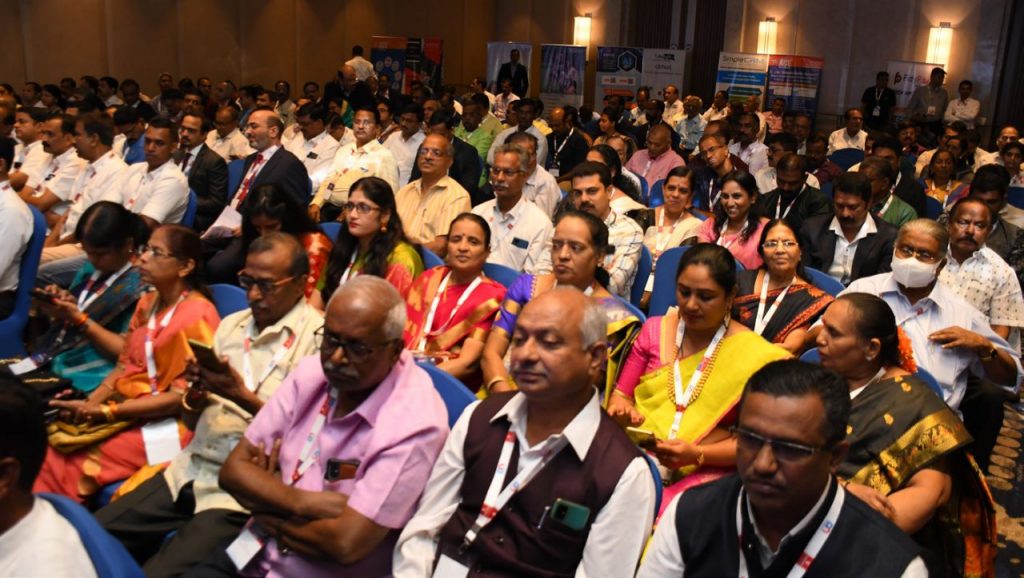The NAFCUB CEO session at FCBA 2022 discussed the deep and wide ramifications and opportunities of Umbrella Organization for the urban cooperative banks:

- Jyotindra Mehta, President NAFCUB; Chairman, Gujarat Urban Cooperative Banks Federation
- Satish Marathe, Founder Member of Sahakar Bharati
- Atul Khirwadkar, CEO, The Kalyan Janata Sahakari Bank
- Madana Gopala Swamy, Director, Adarsh Cooperative Bank
- D Krishna, Former Chief Executive of NAFCUB
- K. Jayaprasad, CEO, Peoples Urban Cooperative Bank of Cochin
- Babu Nair, Group Publisher, Banking Frontiers (Moderator)
Babu: What are the hurdles in bringing together banks under the umbrella? What does the regulator see?
Satish: 50 years back when DIGC was formed, deposit insurance cover was not available to any cooperative bank. After amendments, this cover was provided. But some in the sector were reluctant assuming that they have a strong book balance. But later everyone participated. Currently, participation is voluntary.
 India lacks an umbrella organization like many developed nations have, that can bring professionalism on the basis of data and engage with regulators for policy changes. Advocacy is the need of the hour for the cooperative banking sector. Not only should a conversation with regulators be encouraged, but an open channel among UCBS is also required. The ways of banking are changing rapidly. We need the exposure and expertise to cope up with change. The biggest risk today all the banks face is an interest rate hike. Another challenge faced by urban cooperative banks is policy formation. Many banks find it difficult to navigate this division.
India lacks an umbrella organization like many developed nations have, that can bring professionalism on the basis of data and engage with regulators for policy changes. Advocacy is the need of the hour for the cooperative banking sector. Not only should a conversation with regulators be encouraged, but an open channel among UCBS is also required. The ways of banking are changing rapidly. We need the exposure and expertise to cope up with change. The biggest risk today all the banks face is an interest rate hike. Another challenge faced by urban cooperative banks is policy formation. Many banks find it difficult to navigate this division.
With changing times banking is going to be more complicated. For that, we need a strong organization which will not only do the advocacy but also involve the banks, enlighten the sector, and hand-holding support in policy formation while giving them complete independence.
Babu: Regional co-operative banks want to know their perspective on working. What is the factor which is still holding back some banks to join? What has been your observation about umbrella organizations in your region Telangana & Andhra?
Madana Gopal: We circulated the resolution copy, and subscription of the the umbrella organization and they were also advised of perspectives, focus and features of this organization. When we followed up with them, we found out that some are pessimistic, they also wanted to know the ROI, and some are confused about the technological assistance.
Satish: Simultaneous efforts are being made to launch regional umbrella organizations.
Babu: It has been observed that banks have to be pushed to join when participation is voluntary. What perks can be offered which make banks lucrative to join? For example, the cyber-insurance framework is most critical, how can the umbrella organizations like this help in complying?
Atul: The expert committee links membership of all the facilities to being a member of such an umbrella organization the case might be that individual banks might be doing well, but a lot of cooperative banks are struggling to survive. The umbrella organization will work as a bank wherein it will provide assistance to its members. It can be in the field of technology or setting up processes. The vision of the founders is to bring in a more vibrant sector which grows.
Babu: What is the gentle nudge required for banks to take membership?
Krishna: When a similar committee was formed in 2006, it was mainly to acquire capital from small banks. Since for a long-time, all the banks have been living in silos and no effort was made to bring them together, we have not been able to take advantage from our peers. Many have still not come out of the traditional view that they will have to be more transparent and give in for self-regulation, which goes against existing separately, and this I feel is the biggest burden on such umbrella organizations. Many cooperative banks still talk in terms of what are the benefits of joining such an organization.
When we tried to bring in technology, the biggest challenge was that every bank wanted to tweak it as per their need. This was difficult to implement and big vendors found it difficult to work with us. Hence, cooperative banks settle for a local vendor, which is not the best practice in the long run. Innovations and technology which look very futuristic are achievable, and we have to start thinking along those lines fast. By not adopting the technology, our growth might be at 2-5% while other NBFCs and private banks will reach 10-15% growth.
Babu: What are apprehensions for bankers in Kerala? How can the enrolment increase?
Jayaprasad: Due to the pandemic and floods in 2018-19 in Kerala, urban cooperative banks suffered great losses. The change in a minimum deposit of 0.1% of assets to Rs1 lakh may pave the way for many banks to join this umbrella organization.
Babu: What is the next plan of action and inspire the banks to enrol?
Krishna: We are still in our nascent stages. Maharashtra having the largest number of co-operatives is seeing one association per district. We are yet to explore other states. Fund for such organizations is on track.
Babu: We at Banking Frontiers can help with creating awareness videos and newsletters in native languages.
Jyotindra: We have started the process by translating a few banking books into regional languages. There are banks in which employees do not understand English as well.
Audience: Will umbrella organizations take on the responsibility of educating legal knowledge to their member banks to increase the level of compliance and reduce penalties?
Jyotindra: The biggest work of the umbrella organization will be capacity building. We will definitely guide them with the help of professionals.
Satish: Like other countries, departments of supervision and regulation were merged. After 2008, it was observed that regulation and supervision are 2 sides of the same coin. To avoid disruptions in banking, supervision is being tightened. For various reasons, banks are penalized. This can be avoided by creating a culture of compliance. In spite of given warnings, many banks have defaulted and have been penalized. It should also be noted that banks are not serious about these penalties.
Krishna: The percentage of penalties levied on commercial banks is much higher than that levied on UCBs.
Audience: It is being said that individuality of the banks will be maintained and they will not be merged. The process of reducing the number of public sector banks has started. Can we infer that through such umbrella organizations cooperative banks will also face such a situation?
Jyotindra: The participation is completely voluntary and there is no compulsion to join such an umbrella organization. The fear of merger in most cooperative banks is very much evident, but no such steps are being taken.
Krishna: DICGC has brought in regulations for ease of banking and liquidation.
Audience: How will the UO address the goal of bringing unity among the cooperative banks?
Jyotindra: Umbrella organization will help in increasing business. With newer technology, local tie-up, more transparent business model, which will be provided by the umbrella organization and help in increasing business. In a way, the umbrella will be the catalyst for increasing the business. Many cooperative banks cannot afford the technology and offer internet banking. Which aims to provide the technology and expertise to do so.
Audience: It is a good initiative which provides complete cohesiveness and power to work together. Will the grievances be taken to RBI or the government directly? And will UO in any way become stronger and replace RBI?
Jyotindra: RBI itself has mentioned the UO will work as a self-regulatory organization in later stages.
Atul: Banks which have been penalized cannot be saved by the UO. We should come together so that the customer of the cooperative bank remains in it. In the past 6 months, improvement has been shown and there have been fewer penalties by RBI in our sector. In such a situation, if there is an organization which handholds us for technology, and liquidity at a better price, we must take that opportunity.
Audience: Presently internet banking is not permitted for banks lesser than Rs500 million net worth. Will such discrimination continue or change?
Sushil: The proposal for regulation is on a graded basis and such discrimination will continue. Smaller banks or even cooperative banks do not get all the benefits that are enjoyed by the public sector banks or corporate banks. It is important to take note of risk appetite. Co-operative banks are lagging in cyber-security which puts them at great risk.
_________________
Read more-







